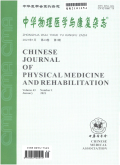10.3760/cma.j.issn.0254-1424.2020.02.102
Long-term paired associative stimulation to restore hand function after chronic incomplete tetraplegia
INTRODUCTION:This case study explores the gains in hand function in an individual with a chronic spinal cord injury (SCI). The intervention was long-term paired associative simulation (PAS). We aimed to provide PAS until full recovery of hand muscle strength occurred, or until improvements ceased.CASE PRESENTATION:A 46-year-old man with traumatic C7 AIS B tetraplegia was administered PAS three times per week. After 24 weeks, PAS was combined with concomitant motor training of the remaining weak hand muscles. Outcome measures included the manual muscle test (MMT), motor-evoked potentials (MEPs), F-responses, hand functional tests, and the spinal cord independence measure (SCIM).DISCUSSION:After 47 weeks of PAS the subject had improved self-care and indoor mobility and was able to perform complex motor tasks (SCIM score improved from 40 to 56). His left hand regained maximum MMT score (total 75; increase of score from baseline condition 19); the effect remained stable in the 32-week follow up. In the right-hand muscles, MMT scores of 4-5 were observed in follow up (total 71; increase from baseline 48). Improved values were also observed in other outcomes. This is the first demonstration of long-term PAS restoring muscle strength corresponding to MMT scores of 4-5 in an individual with chronic SCI. The effect persisted for several months, indicating that PAS induces stable plastic changes in the corticospinal pathway.
42
2023-05-30(万方平台首次上网日期,不代表论文的发表时间)
共1页
129






